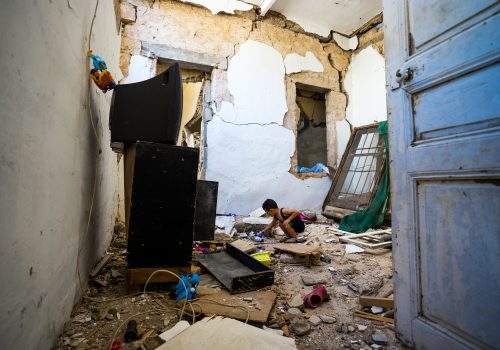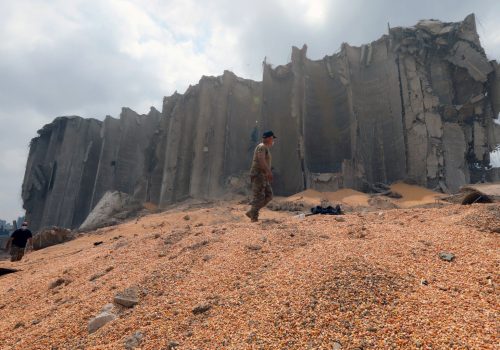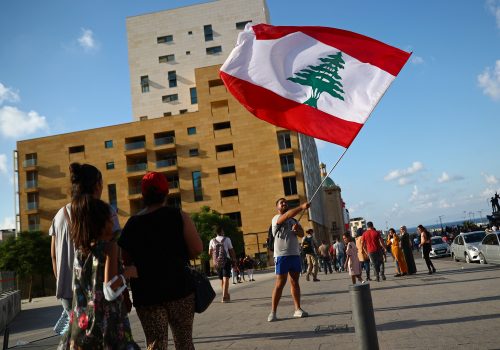Macron’s plan for Lebanon needs independent figures
Lebanon today faces a crisis of bureaucratic proportions. Two generations of pent-up frustration with the inefficient and corrupt government formed in the aftermath of the country’s devastating 1975-1990 civil war. That came to a head in early August when a years-old collection of ammonium nitrate combusted, leaving a crater where the port of Beirut stood, nearly 200 dead, and thousands more injured. For a country already facing an economic crisis and political paralysis, the port explosion was a breaking point, sending Lebanon into a perilous political tailspin. French President Emmanuel Macron is attempting to put the proverbial Humpty Dumpty back together again. But his proposed reforms are doomed to fail as long the same faces remain in power.
Just days after the blast on August 6, the French president was on the ground in Beirut meeting with victims and Lebanon’s political leaders in an effort to defuse the crisis. Crowds greeted Macron as he toured devastated neighborhoods. He was the first world leader to do so and he offered aid directly to NGOs and met with victims of the blast. He also scolded Lebanon’s political class as it became clear that the blast occurred due to their own negligence, earning Macron local praise. Some went as far as creating a petition to have Lebanon placed under French control again—ironic, since it has been exactly a century since France worked with local sectarian leaders to form “Greater Lebanon” in 1920 and helped put in place a confessional system that is a major cause of the current crisis.
Even after Lebanon gained independence in 1948, France has maintained close ties with Lebanon’s political leadership over the years. The European power has regularly convened aid conferences for Lebanon following the end of its civil war only to see the money squandered, a lack of reforms, and further civil unrest. To entice Lebanese politicians, Macron currently is playing a carrot and stick game. Knowing the Lebanese ruling elite are in dire straits due to the country’s economic crisis, the French leader is withholding any fresh funds until he sees tangible reforms enacted. Furthermore, if the Lebanese government does not comply with his proposed reforms, Macron will press the international world for sanctions, knowing that many Lebanese politicians have assets abroad.
The French president has proposed a bold range of reforms, including a full audit of Lebanon’s central bank, the formation of a new cabinet of independent technocrats, changes to the public sector and judiciary within the space of four weeks, and elections to be held in one year under a new election law. Macron is “gambling” his “political capital” in the hopes that Lebanese politicians will abide by his ambitious reform plan.
But his supposed gamble might be a costly one, as Lebanon’s political system—partially created by the French—has been geared to keep its sectarian elite in place.
Instead of organizing any type of transitional period or mobilizing to support the victims of the disaster, Lebanon’s political leaders are already back to business as usual—fighting over which sect should get the Finance Ministry and demanding the new cabinet still include politicians instead of just technocrats. There have already been two fires at the port due to continued negligence and lack of safety procedures in the wake of the blast. In a bid to appear like progress had been made on reforms and to appease Macron before his second visit on September 1, a group of former prime ministers scrambled to nominate a relatively unknown diplomat and one of their former advisors—Mustapha Adib—to the premiership mere hours before Macron landed.
An even more glaring sign of how little the appetite is for reform amongst Lebanese politicians is their negotiations with the International Monetary Fund (IMF). The international institution rebuffed Lebanon’s proposed reforms, as they do not go far enough in fixing the country’s economic tailspin; inflation is nearly 90 percent and the currency has lost 60 percent of its value. Additionally. three of Lebanon’s top negotiators with the IMF have quit, citing the lack of will from the country’s politicians to carry out reforms.
Lebanon’s sectarian oligarchs have been entrenched in power for decades, if not centuries. In everything but name, they are feudal lords who provide patronage to their constituencies in the form of welfare, placement in top schools, and jobs in the country’s bloated public sector. This also extends to unions, the judiciary, the police, and the army—all staffed and headed by the political elite’s partisans. This system has created a hollow state apparatus, with each apparatchik more loyal to their patron, party, or religious sect than to the country as a whole. And given that their livelihood and place in society depends on their faction’s support, these partisans are, in some cases, willing to die for their party or inflict violence on protestors who challenge their authority. During Lebanon’s October 2019 protests, when hundreds of thousands of Lebanese flooded the streets to criticize the government’s handling of the economy, political actors loyal to the speaker of parliament and the presidency burned protesters’ tents and attacked demonstrators.
Moreover, the most well-established, organized, and funded of Lebanon’s factions, Hezbollah, may also be its most dangerous. The group is more than just a political party—its military wing has recently gained valuable combat experience fighting with pro-Iranian forces in Iraq and Syria. Despite a number of protesters denouncing the party, Hezbollah’s patronage base among the disadvantaged Shia remains intact, even if its broader appeal in Lebanon has faded. And, notwithstanding calls for disarmament, Secretary-General Hassan Nasrallah has made the organization’s vast weapons arsenal a red line, meaning that he is not afraid to resort to violence to quell challenges to its legitimacy. In 2008, the party even managed to gain control over vast parts of Beirut when the government attempted to dismantle its communications network, sending a message that Hezbollah will not allow any government to interfere in its affairs. Nasrallah has openly backed President Michel Aoun finishing out his term and threatened that any attempt to initiate a change in leadership will lead to a civil war.
Essentially, the Lebanese political elite is saying it’s either us or chaos.
Unfortunately, Macron has bought into this mentality. Instead of supporting an independent figure such as International Court of Justice Judge Nawaf Salam—popular with the protest movement—the French leader readily accepted the Lebanese choice on the grounds that Adib has parliamentary support. He even chastised the Lebanese opposition for not forming parties and presenting candidates, but this contradicts facts on the ground. In the last municipal and legislative elections, civil society organizations did field candidates in attempts to challenge ruling parties—albeit unsuccessfully. However, Macron cannot expect new political parties to easily oust a ruling class that has been politically entrenched for decades. Even Lebanon’s last government claimed to be technocratic in an effort to appease a disgruntled public and the IMF, but, in reality, it was composed of advisors to Lebanon’s political bosses—showing the resiliency of the sectarian system.
Not all hope is lost, though. Lebanese civil society can point to small, notable victories, including independent figure Melhem Khalaf being elected as the head of the Beirut Bar Association. The October 2019 protests also managed to disrupt most of the country and caused Prime Minister Saad Hariri to resign.
If Macron truly wants to pitch a new political contract for the country, he must work with independent figures and civil society groups capable of drafting a new election law and making effective changes to the public and financial sectors. Lebanese leaders have shown that they wish to perpetuate the same system with only minor adjustments to keep their seats of power. They are also resorting to oppressive measures to stifle any opposition by placing Beirut under military rule and using tear gas, rubber bullets, and occasionally live ammunition, which has left 700 people injured. Due to this reality, Macron must use his leverage to create space for new voices that are not inclined to perpetuate the same corrupt system if he is serious about facilitating a new political contract for Lebanon.
Paul Gadalla is a former Beirut-based journalist who also worked in communications at the Carnegie Middle East Center in Lebanon. Follow him on Twitter: @BoulosinDC.
Image: French President Emmanuel Macron speaks with Arnaud Tranchant, commander of the Tonnerre helicopter carrier, as he meets with UN representatives and NGOs mobilised for the reconstruction of the port of Beirut, in Beirut, Lebanon September 1, 2020. Stephane Lemouton/Pool via REUTERS


